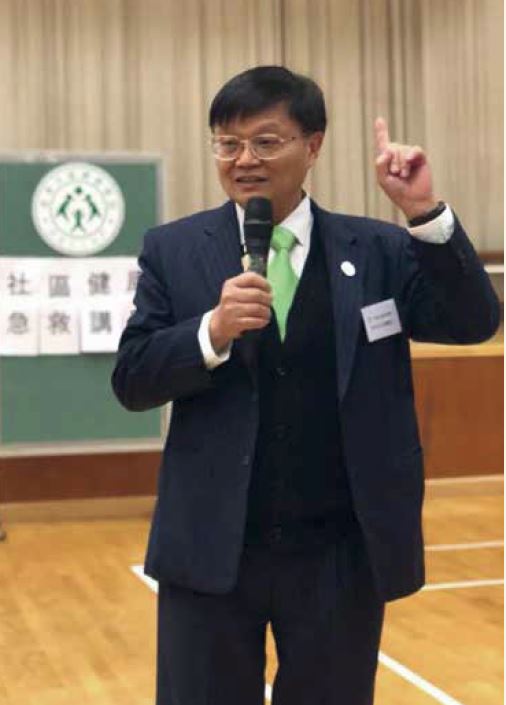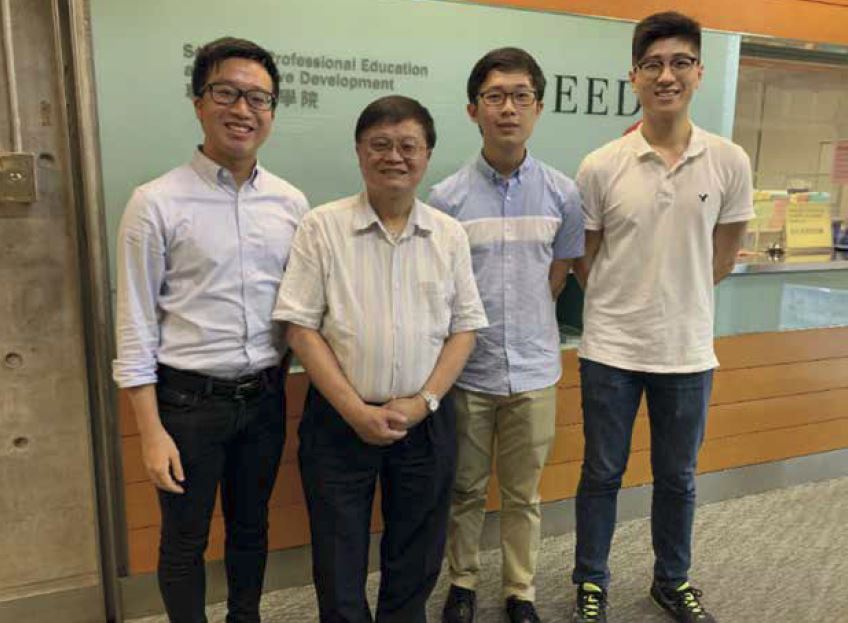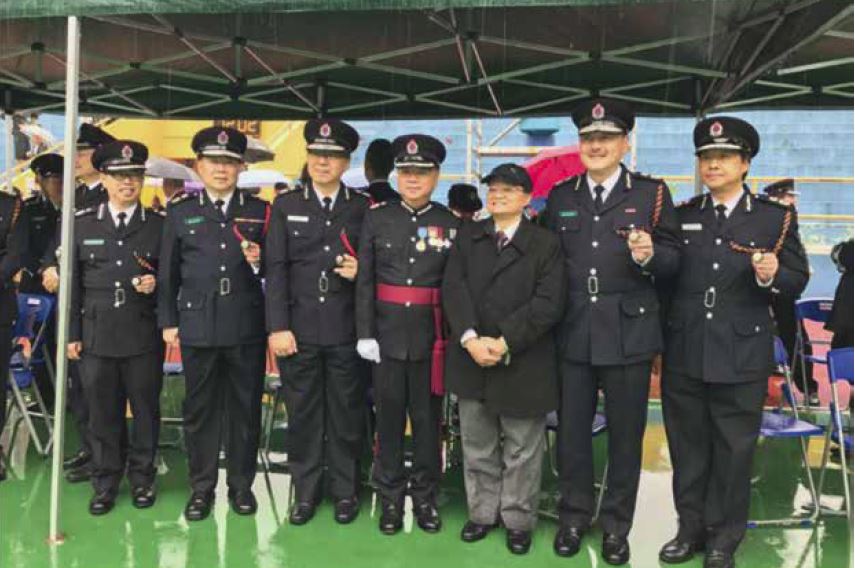© Hong Kong Academy of Medicine. CC BY-NC-ND 4.0
HEALTHCARE FOR SOCIETY
A mind that builds; a heart that serves—An interview with Dr Ben Fong
Gordon Chin1; Justin Leung2; Oscar Shen2; William Xue3
1 Year 3, The Chinese University of Hong Kong
2 Year 4, The Chinese University of Hong Kong
3 Year 6, The Chinese University of Hong Kong
Dr Ben Yuk-fai Fong, Associate Division Head of
the Division of Science, Engineering and Health
Studies at PolyU SPEED, developed an interest in
Community Medicine from the very earliest days
of his career. Since graduating from the University
of Sydney over 30 years ago, Dr Fong has served in
public, private, and university healthcare facilities in
both Hong Kong and Sydney. Dr Fong has managed
two local hospitals—Ruttonjee Hospital and Union
hospital—and he was also the Deputy Medical
Superintendent of the Prince Henry Hospital of the
University of New South Wales in Australia.
Devotion to volunteering
Dr Fong’s volunteer work began while he was still
Medical Superintendent at Ruttonjee Hospital.
Joining the Auxiliary Medical Service (AMS) in
1995, Dr Fong put his many years of experience in
medical administration to good use. The AMS is
composed of over 4800 healthcare professionals
and lay volunteers, all working together to provide
paramedical support in times of emergency and first aid coverage for community events. As Senior
Assistant Commissioner, Dr Fong played a crucial
role in steering the development of the AMS
towards providing more comprehensive and higher
quality services. He helped set up the AMS Training
Institute in 2000 and the First Aid Bicycle Team in
2002, as well as directing the medical support for
large-scale events such as the Standard Chartered
Hong Kong Marathon. Constantly striving for
improvements, Dr Fong identified and addressed
deficiencies in his team’s capabilities, and suggested
everything from increasing first aid stations during
marathons to providing first aid training for other
uniformed services.
Despite the demands of his other
responsibilities, Dr Fong dedicated a great deal
of his time to the AMS, including their training,
recruitment, field work, and public services.
“Volunteering gives me another kind of satisfaction,”
said Dr Fong, reflecting on his time in the AMS.
When it comes to volunteering, Dr Fong advises
that personal ambition and financial considerations
should be kept out of the picture. “As a private practitioner, providing free first aid services is bad
for business”, he quipped. In his opinion, trying to
rise through the ranks of a volunteer organization is
simply a distraction from contributing what you can
to society, inviting stress instead of fulfilment.
When compared to his previous duties as head
and Chief Executive of local hospitals, where he had
to meet strict performance indicators as expected by
the Board, Dr Fong found his volunteer work to be
a pleasant change of pace. A community medicine
specialist, Dr Fong brought with him a unique
perspective. When his colleagues fretted about
volunteers leaving the AMS soon after completing
training, seeing it as a waste of resources, Dr Fong
pointed out that the volunteers would carry the skills
and knowledge they learned into the community, and
that individuals with paramedical training are useful
assets to society regardless of whether they are in
the AMS. After all, they might one day save lives, if
they happen to be in the right place at the right time.
In cases like these, his ability to see the long-term
benefit to the population reflects the mindset of an
experienced community medicine practitioner.
Advocacy of community health
In addition to serving the public through both his
work and during his free time, Dr Fong also wants to make a change in society—to promote the
concept of community health. With this in mind, he
established the Hong Kong College of Community
Health Practitioners (HKCCHP) in December 2017.
His intention was not only to provide a platform for
graduates to utilise their recently gained knowledge,
but also to empower citizens with better health
knowledge. During the 2019 outbreak of measles,
members of the HKCCHP toured around the
different districts of Hong Kong to give talks, hoping
to raise awareness and educate the public regarding
this highly contagious disease which had attracted
wide media coverage and caused public fear.
Governmental directives and financial
incentives are crucial to healthcare policy making,
but ultimately healthcare is of the people, by the
people, and for the people; thus, every stakeholder
has a role to play in upholding community health.
“Community health needs a more bottom-up
approach, where everyone in society could take the
initiative”, said Dr Fong. In 2003, Dr Fong helped
to recruit local private general practitioners to
visit and consult schools in Shatin, in line with the
government’s “one school one doctor” policy. He also
responded to the queries of readers of SkyPost and
the Oriental Daily regarding the recent coronavirus
disease 2019 pandemic, proactively alleviating the
concerns of many citizens.
Dr Fong believes that community health
practitioners play an important role in case
management. Such an idea was seeded when he
was working at Prince Henry Hospital, where
Nursing Consultants were responsible for managing
day cases for endoscopic lithotripsy performed
by urologists, allowing the doctors more time to
concentrate on their own trade. With an ageing
population in Hong Kong, the shortage of human
resources in healthcare has become an increasingly
pressing issue. If community health practitioners
were recognised as an independent component
of the healthcare workforce as case managers, the
expanded healthcare team could provide more
effective, individualised, and holistic patient care.
Dr Fong revealed his excitement after
learning that Kwai Tsing District Health Centre had
recently established a post for community health
practitioners—the first of its kind in Hong Kong
after many years of promotional effort. “Just as we
did not have much subspecialty training in Hong Kong back when I first joined in 1985, now we are
witnessing a revolution in health team reform,” he
commented.
Looking forward
Working in public health is very different from
treating individual patients. Dr Fong commented
that one of the biggest takeaways from being a
community medicine specialist is acquiring a
wider perspective, “seeing the forest, not single
trees”. Because community health and healthcare
administration constantly deal with the big picture,
Dr Fong advises that those who are interested
should enjoy meeting people from different trades,
be proactive in managing public provisions before
problems occur, and persevere in community
health interventions even though results might not
be immediately apparent. Above all, he believes
that serving the community requires commitment,
devotion, and a good heart.

Dr Fong at a community lecture on first aid and home safety, co-organised by the Hong Kong College of Community Health Practitioners (photo courtesy of Dr Fong)

Dr Fong (second from left) with student journalists (from left: Justin, Gordon and William) at PolyU SPEED


